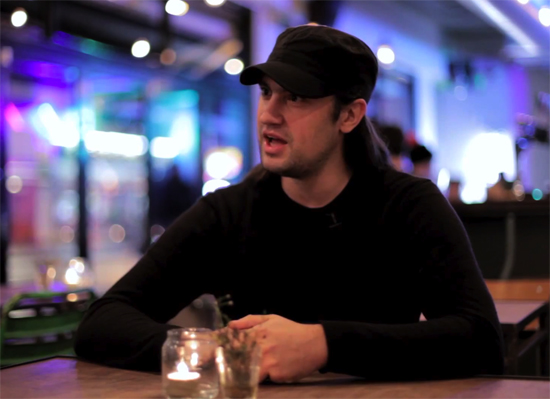Tonight, three men, over three seamless monolithic sets, present three parallel sonic universes.
Almost 12 months ago, I saw Keiji Haino’s avant-power trio Fushitsusha in St John at Hackney Church, and that could hardly have differed more from tonight. Then, I was met with an empty and chairless nave and a standing crowd; now I see a seated congregation facing the pulpit. It seems oddly contradictory to expectations, as Keiji Haino’s physical theatre made the evening as visual as it was an aural experience, whereas the latest instalment of the St John Sessions sees three artists whose music all stems from the assumption of blindness that comes with club and headphone music. It’s a minor point, but perhaps telling of the misconception (or maybe my own mistaken reading) that Fushitsusha are for headbangers, and that Vessel, Pete Swanson and Tim Hecker are for chin-scratchers.
Though vastly differing, Tim Hecker, Pete Swanson and Vessel are all united by their appreciation for murkiness and ambiguity in the construction of their music. Young Echo member, Sebastian Gainsborough – aka Vessel – uses the lilting caress of delay to extrapolate his dark soundscapes into cavernous epics before punkishly adding Bristolian beats and glitches to craft the sort of searing deep dub intensity that characterises the youthful otherworldly genius of Bristol’s new school. For tonight’s set he gives a little extra breathing space to his set than normal, ending with some ten minutes or so of extended ambience. Whether in tribute to Hecker or an opportunistic use of the Church’s inherent mystique, it’s a reminder that – behind the beats – the likes of Vessel and Young Echo often have far more in common than one assumes with North American noise and experimental ambience. Imagine ‘Jupiter Rise’ (one of Vessel’s contributions to Young Echo’s brilliant Nexus album) without the beats, and the influence of Hecker’s pre-Ravedeath catalogue is boldly apparent.
Enter another few dozen trendy punters (the volume of fixed gear bikes outside is steadily growing over the course of the evening), grab another tinny and back to the nave for Pete Swanson. Typically be-capped, Swanson launches straight into things with a wall of static noise that gradually becomes punctuated as the semblance of a beat punches its way through the white noise. The set is a logical extension of the Punk Authority EP, with the first half dominated by relatively stationary static and a pounding single note beat that felt more 1/1 than 4/4, and the second slowly approaching electronic anarchy as Swanson adds a synth line here and a percussive tone there, eventually reaching the dizzying madness of Punk Authority’s grand finale, the quarter of an hour ‘Life Ends at 30’. It could all easily be missed behind the veil of ear-splitting white noise. Swanson’s music sounds like the ecstatic height of some endless bacchanal hardcore night, albeit broadcast through a gutted car radio. The top-end horror of high def Ibiza synths is removed, leaving little more than that throbbing wall of noise and beats. By this point, its worth noting that most of the audience are seated, staring up at Swanson on the pulpit in the midst of noise-rave paradise, leaving them with little left to do than look bemused.
Ears ringing, and body hurting, there is only brief respite before the lights dim to near-total darkness, and a half-visible Tim Hecker takes position behind a handful of gizmos and a laptop ready for mass. Though word of Tim Hecker gigs performed in total darkness has appeared online, the relentless glow emanating from London illuminates St. John-at-Hackney’s 18th century windows, rendering the novelty impossible. Instead we have to make do with candlelight, and a misty glow across the congregation. Hecker’s notoriety and acknowledged influence has exponentially grown since his award-winning Ravedeath, 1972 in 2011. It was the album on which the organic material and his process snapped into focus, and a decade of music-making finally coalesced into his most cohesive and powerful statement. This year’s follow up, Virgins walks a starker path than its predecessor, but continues the former’s twisted reliance on organic acoustic source material.
Slowly awakening the speakers with a light distant drone that slowly moves into the foreground, Hecker quickly introduces the dulcimer-like hammered string sounds that dominate several track on Virgins. Hecker slowly eases the ancient sounding hammered-string samples in and out of phase, making full use of both the stereo spread at his disposal and the conversational possibilities with the walls of the Church. The volume increases, and the Reichian hypnosis takes over. The constant ebb and flow of Hecker’s seamless set is easy to get lost in, and suddenly the organic samples die down to reveal melodic sine waves and sub bass. Synth tones hang in the air, meeting and dancing over our heads in the cavern of the nave. Head throbbingly loud organ samples linger and overlap, and the ever-loudening bass tones feed the nagging suspicion that the superficial signs of fatigue on the decaying church walls will in fact give in and collapse under such volumes. While Swanson’s intensity was sheer, Hecker’s is born from the constant second-by-second candlelit surprises. Slow-moving, ranging from pin-drop quiet to stomach-churning loudness, and still as enigmatic as ever, Tim Hecker’s music is both a dream and nightmare.
Turn the lights on, and go in peace.


